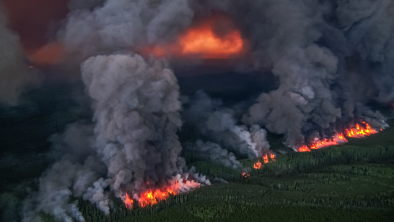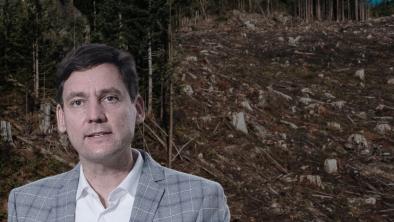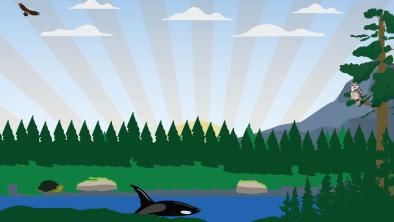Saving Fish Lake - Wild Times

November 1st, 2010 - Read Joe Foy's Wild Times column in the Watershed Sentinel as he excamines the history behind the fight to save Fish Lake.
The more I travel the province of British Columbia where I was born and raised, the more I am in awe of BC’s home-grown diversity. This amazing place has more wildlife species than any other province and more First Nations’ languages than all the rest of Canada combined! A rich and ancient record of human history flows along the salmon rivers and forested valley bottoms like a mist and rises to cover even the very tallest of peaks.
Learning to hear the echoes of these past times is a tricky business. But if we want to know where we are headed in the future, I figure it’s best to know where we have been.
The vast Chilcotin Plateau is one place where the past mixes with the present until it’s hard to tell one from the other.
Back in 1983, I hiked for three weeks across the Chilcotin Plateau which starts at the Fraser River in the 100 Mile House to Quesnel region, then slopes up to the icy picket fence of the Coast Mountains. On that trip I followed the route that Alexander Mackenzie and his group had hiked across the Chilcotin way back in 1793 on their successful quest to find a route to the Pacific. Mackenzie’s group were shown the way forward by native people they met along the way.
In a meadow, where I stopped for lunch one day, I read in Mackenzie’s journal that they too had rested here at a village site with nine Tsilhqot’in pit houses. The Tsilhqot’in people who lived here had treated him and his party to a fish dinner. From where I sat, I could see the nine pit house depressions still there in the meadow. I swear I could almost smell that fish dinner cooking and hear the laughter of the Tsilhqot’in as they feted and fed their guests!
If you are really lucky, and sharp- eyed too, sometimes you can see wild horses running through the meadows of the Chilcotin. They are a living reminder of the young Tsilhqot’in Chief, Klattasine, who, in 1864, astride an ancestor of today’s wild horses, led the largest armed resistance to the colonial government to ever occur in BC.
Klattasine and his followers fought to prevent the building of a road from the coast, across the Chilcotin Plateau to access the new gold mines in Barkerville. Klattasine (whose name in Tsilhqot’in means “we don’t know his name”) knew that if the colonial government succeeded in carving a road through the country of the Tsilhqot’in, the abundant fish and wildlife would be decimated in the face of an onslaught of gold miners. It’s a long sad story, but the short of it is that a number of road builders lost their lives, as did a number of Tsilhqot’in, including Klattasine.
The gold road from the coast was never built and the Tsilhqot’in people still hunt and fish in their beautiful country today.
Mark Twain once said that, “History does not repeat itself, but it does rhyme.”
And once again a mine – this time it’s gold and copper – threatens to rip apart the lands of the Tsilhqot’in. A mining outfit by the name of Taseko Mines Ltd. proposes to excavate a massive open pit mine, then use near- by Fish Lake (called Teztan Biny in Tsilhqot’in), as a waste rock dump site. Fish Lake currently contains so many rainbow trout it’s been listed as one of the top ten fishing lakes in the province. It’s been a source of Tsilhqot’in food since well before the time of Klattasine and Mackenzie.
The current colonial government in Victoria supports the mining company’s proposal to bury Fish Lake. And the Tsilhqot’in have again vowed to protect their country. That’s history rhyming for sure. But do we really want to go back to that sorry part of our history?
The Tsilhqot’in communities and their friends across the province, including me – are calling for a different tune, where the land and people are respected.
The decision whether or not to approve the mine at Fish Lake now rests with the federal government. Commit to writing Prime Minister Harper today (pm@pm.gc.ca). Tell him how strongly you want the mine plans abandoned.
Let’s write a new history rhyme - one that ends with us all at a celebration dinner on the shore of beautiful Fish Lake.
For a great web site about Fish Lake, see www.teztanbiny.ca
Breaking News
“OTTAWA, Ont. -- November 2, 2010 -- The Government of Canada today announced…the Prosperity mine project as proposed, near Williams Lake, cannot be granted federal authorizations to proceed due to concerns about the significant adverse environmental effects of the project.
“…In making its decision, the Government of Canada took into consideration the conclusions of the report of the Federal Review Panel, and agreed with the Panel’s conclusions about the environmental impacts of the project.”
Photo: Chief Marilyn Baptiste, who represents the Xeni Gwet’in (pronounced “honey gweteen”) community – the closest Tsilhqot’in community to Fish Lake – speaks at a rally in Vancouver
Joe Foy is Campaign Director for the Wilderness Committee, Canada’s largest citizen-funded membership-based wilderness preservation organization.


